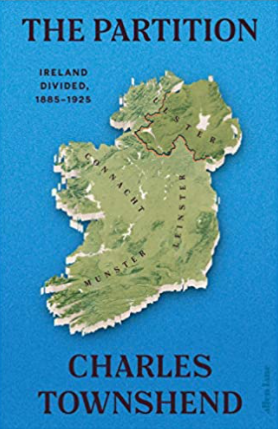
Hard border, a failure of both British and Irish statecraft


The Easter Rebellion in 1916, as the Irish Government had a dilemma, as to how the upraising be commemorated, as the Republic of Ireland came into being as a consequence of the “ Rising” and thus the centenary could be marked in the most official way possible by having the Irish Army parade through Dublin on Easter Sunday, 2016.
The stability of the Republic, as symbolised by the warm response of the crowd to the army that day, is strongly belied by an examination of how the political map of the country was carved out 100 years ago to create two political entities, the border between north and south was created by a dithering British government to satisfy the most intransigent and determined among Ireland’s warring factions as the partition had all the elements of expediency, fudge, and all the problems resulting from a Catholic minority that felt no allegiance to the new state the possibility of violence between the minority and the Protestant majority, an unwieldy border impossible to police. More recently Brexit has brought a reminder of the wider relevance and disruptive qualities of the Irish border.
In the aftermath of the horrors of the Irish famine, the grim, distrustful relationship between Ireland and the rest of the United Kingdom deteriorated into a generations-long argument about “Home Rule”. Most Irish people wanting to break away from the world’s largest Empire- made it extraordinarily difficult for either side to come up with a compromise. For many years actual independence seemed inconceivable. Bitter disputes continued, it became clear that under no circumstances would the Protestants be a party to any of it.
Charles Townshend in The Partition has meticulously studied how and why the Irish border was created and how various British governments and Irish nationalists were outmanoeuvred by a group of Ulster Unionist whose lack of imagination was compensated by obstinacy and inflexibility. “The intensity of Unionist hostility to home rule presented a political challenge of exceptional difficulty”, Townshend writes.
The Partition gives a clear-sighted and thoughtful account of how two unthinkable events – full Irish independence and the creation o the state of Northern Ireland – came to pass. The Irish nationalist claim to leave ran into a loyalist demand to remain, increasingly centred on the northeastern Protestant community, threatening large scale violent resistance. Charles Townshend lays out the insoluble problem and the settlement of the Irish question drew in every major politician, conjured up heroes and villains, led to the civil war and finally to Ulster’s catastrophic Troubles. The hard border has always been seen as a failure of both British and Irish statecraft but has endured now for a century. The partition brings to life the contingency and uncertainty that created it.
Home rule had become one of the most bitter and divisive issues of British politics in the late 19th and early 20th century. Ireland itself was divided between nationalists, predominantly Catholic, pushing for independence, and Unionist, many of whom were Protestant feared “Rome Rule” and wished to remain British.
In 1912, House of Commons debate on home rule, “a polo-playing Devon Yeomanry officer” called Agar-Robartes put forward an amendment saying that four northern counties – Antrim, Armagh, Down and Londonderry- should be excluded from the jurisdiction of the home rule parliament”. He argued that “everyone will admit that Ireland consists of two nations different in sentiment, character, history and religion”. It was he said, “ absolutely impossible to fuse these incongruous elements together”.
Edward Carson, leader of the Ulster Unionist, saw the proposal as a “ Wrecking manoeuvre” against the entire plan for home rule rather than a goal. John Redmond, the leader of the nationalist Irish Parliamentary Party, saw partition as “unthinkable “.
Others, like St Loe Strachey, editor of The Spectator, set out the advantages starkly. If “ the Celtic fringes of Ulster” were excluded, he wrote, “ you would gain immensely in strength because you would be a concentrated Protestant Teutonic community”.
Underscoring its opposition to home rule, the Ulster Volunteer Force, a local unofficial militia, began to arm and drill, importing 20, 000 rifles into the port of Larne in April 1914. Over half a million people in Ulster signed a covenant in 1912, to oppose home rule.
The Partition: Ireland Divided 1885-1925 by Charles Townshend, Allen Lane, £25m 368 pages.
